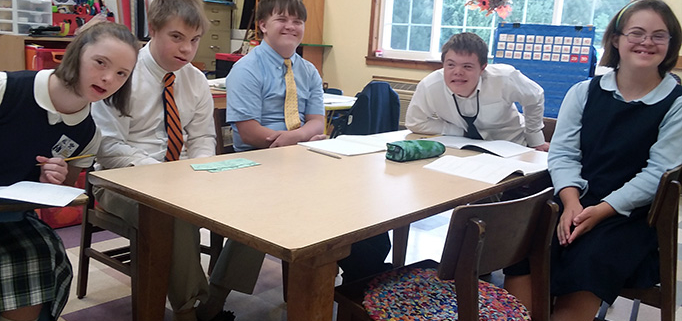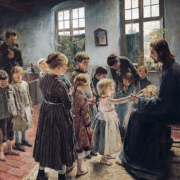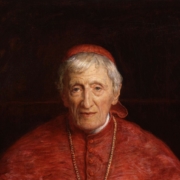How This Catholic School Welcomes Children with Down Syndrome
When the students and faculty of Holy Family Academy in Manassas, Virginia, attend this year’s March for Life in Washington, D.C., their group will include children with Down syndrome. It’s an important pro-life statement: in the United States, upward of 75% of preborn babies diagnosed with Down syndrome are killed by abortion.
But Holy Family — a small, lay-established school that is faithful to Catholic teaching — does more than advocate for the life of these children. It helps give them an education through its beautiful St. Anne Program, launched at the beginning of the last school year.
Each Friday, students aged 8 to 18 with Down syndrome participate in academics, music and art as a cohort, joining with the remainder of Holy Family’s K-12 students for Mass, lunch and recess. Parents homeschool the children through the remainder of the week.
“As a Catholic school, we are committed to promoting the dignity of life,” says Mo Woltering, headmaster at Holy Family Academy and former executive director of The Cardinal Newman Society in the late 1990s. He believes that, while students with Down syndrome have significant intellectual challenges, they have a human right to formation in mind, body and soul — and the program has “worked really well” for other children, too.
“Students see that children with Down syndrome are welcome at the Academy, and that the school has a commitment to education for these members of our family,” Woltering says.
Unique classical model
The St. Anne Program addresses a top priority for the local Diocese of Arlington. Bishop Michael Burbidge has called for more inclusion in Catholic schools, noting that students with special needs “show others the face of Christ and bring out the best in all of us.” He recently highlighted programs at two schools on the Newman Society’s Catholic Education Honor Roll: Bishop O’Connell High School’s expanded services and Paul VI Catholic High School’s Options program.
Other schools on the Honor Roll and around the country wonderfully combine faithful Catholic education with care for students who might otherwise be excluded. But one thing that is special about Holy Family’s St. Anne Program is that students have the opportunity to partake of a classical Catholic curriculum.
“The program reflects our basic commitment to classical education: that it’s for everyone, and that it will feed the souls of students with Down syndrome, albeit in a different way,” says Woltering. These students “show us a new type of connection with the classics, and with the true, the good and the beautiful.”
Another unique aspect of the Holy Family Academy program is that it focuses exclusively on children with Down syndrome, which Woltering says serves the students well.
“Many special education programs tend to lump their students together, but there are many educational and emotional differences among various special needs children,” he says. “A feature of our program is that the needs are similar, and so we are able to address them in a consistent manner.”
For social and recreational time, other Holy Family students serve as “ambassadors” for the St. Anne children. For many students, it’s the “highlight of their week,” Woltering says, and “friendships have quickly formed.”
“It’s always so much fun to see them on Fridays, they have such big smiles,” says Woltering. “On the friendship level and on a joy level, it’s been a big success.”
Family oriented
Catholic school programs like this recognize the dignity of each human being and benefit both students with special needs and the rest of the school community. This is the mission of Catholic education in action. As Pope Benedict XVI told Catholic educators during his 2008 visit to the United States, “No child should be denied his or her right to an education in faith, which in turn nurtures the soul of a nation.”
At Holy Family, the students with Down syndrome bring so much to the school, and the Academy has been a big help to parents in forming their sons and daughters in the Faith. It is — as Catholic education should be — a service by and for families with shared needs.
Mary Radel, instructor for the St. Anne’s program, has a younger brother with Down syndrome. The youngest child of Woltering and his wife Denise, who directs the grade school curriculum and whose parents founded the Academy, also has Down syndrome but is not yet old enough for the program.
Only a year and half into the pilot project, Woltering hopes that the St. Anne Program will expand and succeed into the future. “It will be really exciting to see that, to experience that, and share that with others too,” he says.
May Holy Family Academy’s example inspire other Catholic educators to do something similar to celebrate and improve the lives of children with special needs. It is yet another piece in the renewal of faithful Catholic education, with just the right combination of traditional devotion and innovative methods that is needed to serve Catholic families.
This article first appeared at The National Catholic Register.



 Photo by David Mark via Pixabay CC0
Photo by David Mark via Pixabay CC0


